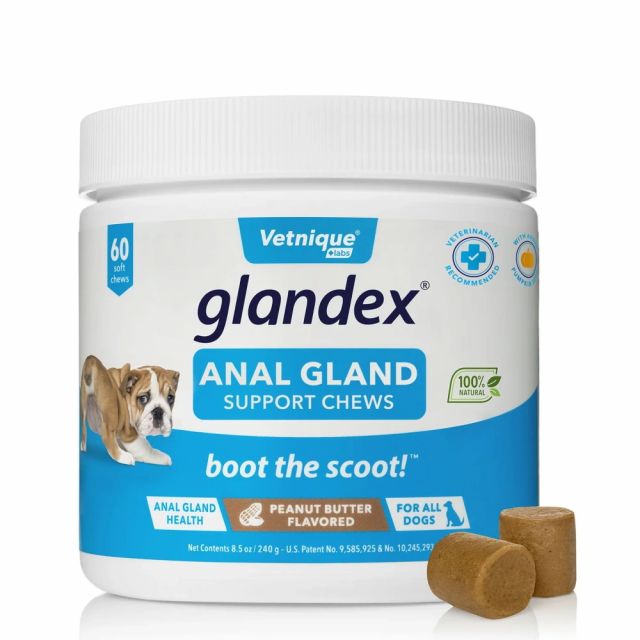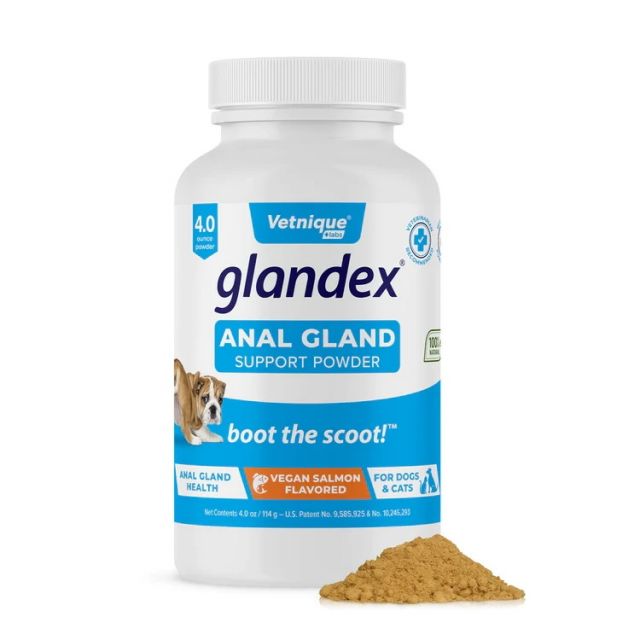Anal glands dogs
Many dogs experience problems with their anal glands at least once in their lives. Some are unlucky enough to have recurring blockages or inflammation of the anal glands and need to visit the vet regularly to have them expressed. Often, there is an underlying cause. In this article, we explain how dogs can develop anal gland problems, why the term “anal glands” is actually incorrect, and what you can do yourself to help prevent issues as much as possible.
Anal glands or anal sacs?
Dogs have anal sacs: small indentations of the skin next to the anus (in the 4 and 8 o’clock position). These sacs contain sebaceous glands that secrete a strongly smelling anal gland fluid. This scent helps with communication and marking territory.
The fluid is usually released naturally during defecation. Although people often talk about anal glands, “anal sac” is the correct term because they are not true glands.
Problems with a dog’s anal glands
Many dogs occasionally or regularly experience itching around the anus. Often, this indicates problems with the anal glands, but sometimes the sacs are blamed when the itching actually has another cause, such as itching due to atopy, flea allergy, or a food sensitivity. If it is confirmed that the anal glands are the source of the problem, the following issues may be present:
- Blocked anal glands
- Inflamed anal glands
- Anal gland abscess
- Tumor of the anal sacs
In cases of stress or anxiety, dogs may sometimes spontaneously empty their anal sacs, which causes odor and discomfort but is not abnormal. Some dogs have anatomical issues that prevent proper emptying of the sacs, leading to blockages.
Secondary issues may also develop if the sacs are not emptied often enough, for example due to diarrhea, obesity, or behavioral factors such as insufficient rest or irregular defecation.
Dogs with itching around the anus from causes other than blocked or inflamed anal glands often show scooting or biting/licking. This can irritate the skin and cause the anal sacs to become inflamed – a ‘secondary problem’.
Symptoms of anal gland problems in dogs
Dogs with anal gland issues often scoot (drag their rear across the ground), lick or bite excessively around the anus, sometimes resulting in a hotspot, or suddenly sit down during walks. They may also experience pain while sitting, walking, or defecating.
Other signs include frequent urges to poop, small amounts of stool, blood in the stool, or a swelling next to the anus. Sometimes, a dog will spontaneously release foul-smelling anal gland fluid.
In severe inflammation, ruptured abscesses, or tumors, wounds or fistulas (holes in the skin) may appear around the anus.
Blocked anal glands
There is often an underlying cause for blocked anal glands. The glands, for example, may not empty properly in overweight animals or those with diarrhea (their stool is too soft to massage the sacs during passage). In some dogs, no cause is found—this is called a “primary blockage.”
The treatment is to empty or "express" the anal glands. This temporarily resolves the issue, but it often returns. Addressing the underlying cause is essential.
Inflamed anal glands
The cause of anal gland inflammation is often a blockage. Other possible causes include incontinence, diarrhea, obesity, or an abnormal tail base (e.g., in bulldogs or pugs).
Abscesses of the anal glands often result from blocked or inflamed glands that aren’t treated in time. Dogs with an anal gland abscess may not show typical symptoms like scooting or itching, but instead suddenly have a large lump (or even a hole if the abscess bursts) next to the anus. These dogs are often sick and have a high fever. An anal gland abscess is also very painful.
Treatment usually involves emptying and flushing the sacs or abscess, and administering antibiotics, either topically (as ointment) and/or in tablet form. Pain relief with painkillers for dogs is also typically given.
Anal gland tumors
Anal gland tumors are not very common. Unfortunately, they are usually malignant. The tumor itself may go unnoticed, but the dog may drink excessively. This is because these tumors raise calcium levels in the blood.
Other tumors around the anus that don’t originate from the anal sacs are perianal gland tumors. These are more common and are usually benign. They are especially seen in unneutered male dogs. Treatment consists of surgical removal of the tumor and neutering the dog.
Causes of anal gland problems
As you've read, anal gland problems are often linked to underlying conditions. It's a good idea to discuss with your vet whether that may be the case for your dog. Repeated anal gland expression is unpleasant for your dog and may be unnecessary if the root cause is addressed.
Signs of underlying problems include:
- Itching, also in other areas such as ears, paws, head, groin
- Frequent ear infections
- Overweight
- Frequent loose stools
Obviously, addressing the root cause is the most important thing.
In cases of allergies, identifying the cause is crucial. As a support, you can give your allergic dog extra fish oil: it has anti-inflammatory effects and supports the skin barrier. Fish oil supplements for dogs include Doils Skin and Megaderm. For a food allergy, a hypoallergenic diet is essential. Dogs with allergies are also often given anti-inflammatory medication for dogs to suppress itching and allergic reactions.
If your dog is overweight, you can help him lose weight safely with Sanimed Weight Reduction.
Supplements for support
To help keep your dog’s stool firm, you can add psyllium fiber from Iso-Gel to the diet. Probiotics such as Purina Pro Plan FortiFlora help maintain a healthy gut flora in your dog.
There is also a supplement specifically developed to support healthy anal glands in dogs: Glandex Anal Gland Support Chews or Powder. These peanut butter-flavored chews or salmon-flavored powder contain fiber, probiotics, omega-3 fatty acids, and digestive enzymes to optimally support the anal glands.
Preventing anal gland problems
Does your dog regularly suffer from anal gland problems? Then it’s important not just to treat the symptoms, but also to look for potential underlying causes such as obesity, digestive issues, or allergies. At Pharmacy4Pets, you’ll find everything to support healthy skin, good digestion, and firm stools – from hypoallergenic diets and fish oil to fiber-rich supplements and probiotics. This way, you support your dog from the inside out and help prevent recurring issues.
Do you have questions about Pharmacy4Pets products or your dog’s anal glands? Please feel free to contact us for expert advice.



